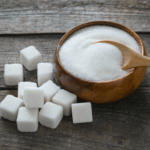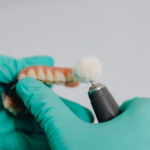Let’s face it, no one wants to be the person with bad breath. That awkward moment when you realize your conversation partner is subtly backing away? Not fun. But before you start panicking, know that occasional bad breath is incredibly common, and often, the causes are easily addressed.
This isn’t a deep dive into obscure medical conditions. Instead, we’re focusing on the everyday culprits behind less-than-pleasant breath and, more importantly, what you can do to freshen things up. Think of this as your friendly guide to achieving a confident, kissable smile.
The Usual Suspects: Common Reasons for Bad Breath
So, why might your breath be less than stellar? Here are some of the most frequent offenders:
1. The Mouth Microbiome (and What They Eat):
- Food Particles: Tiny bits of food get trapped in your teeth, on your tongue, and around your gums. These leftovers become a feast for bacteria naturally present in your mouth. As these bacteria break down the food, they release sulfur compounds – the same stuff that makes rotten eggs smell… well, rotten. Garlic, onions, and spices are notorious for contributing to this, but even seemingly innocent foods can play a role.
- Dry Mouth (Xerostomia): Saliva is your mouth’s natural cleaning agent. It washes away food particles and neutralizes acids produced by bacteria. When your mouth doesn’t produce enough saliva, these bacteria can thrive, leading to bad breath. Dry mouth can be caused by dehydration, certain medications, mouth breathing, or even just sleeping.
2. Oral Hygiene Habits (or Lack Thereof):
- Infrequent or Ineffective Brushing: Brushing your teeth removes plaque and food particles. Skipping this crucial step allows bacteria to multiply and release those smelly compounds.
- Forgetting to Floss: Your toothbrush can’t reach the tight spaces between your teeth where food and plaque love to hide. Flossing dislodges this debris, preventing bacterial buildup.
- Ignoring Your Tongue: Your tongue has a textured surface with numerous crevices where bacteria can accumulate. A white or yellowish coating on your tongue is often a sign of bacterial overgrowth contributing to bad breath.
3. Lifestyle Factors:
- Smoking and Tobacco Use: Smoking not only leaves a distinct, unpleasant odor but also dries out the mouth and contributes to gum disease, both of which are major causes of bad breath.
- Dieting and Fasting: When your body breaks down fat for energy, it produces ketones, which can be released in your breath, sometimes resulting in a fruity or acetone-like odor.
4. Underlying Health Conditions (Less Common, But Possible):
While most bad breath issues stem from oral hygiene and lifestyle, persistent bad breath could occasionally indicate an underlying medical condition such as:
- Gum Disease (Periodontitis): This serious infection damages the gums and bone supporting your teeth, creating pockets where bacteria can flourish and produce foul odors.
- Sinus Infections: Mucus buildup in the sinuses can drain into the back of the throat, providing a breeding ground for bacteria.
- Other Medical Conditions: Rarely, conditions like diabetes, kidney disease, or liver disease can contribute to breath odor.
Fresh Breath to the Rescue: Your Action Plan
The good news is that most cases of bad breath are easily fixable with a few simple changes to your routine:
1. Step Up Your Oral Hygiene Game:
- Brush Thoroughly Twice a Day: Use a fluoride toothpaste and brush for at least two minutes, ensuring you reach all surfaces of your teeth.
- Floss Daily: Don’t skip this! Make flossing a non-negotiable part of your daily routine.
- Clean Your Tongue: Use a tongue scraper or your toothbrush to gently remove bacteria and debris from the surface of your tongue. 1 1. www.northeasternbraces.com www.northeasternbraces.com
- Consider an Antibacterial Mouthwash: While not a substitute for brushing and flossing, an antibacterial mouthwash can help reduce bacteria in your mouth. Choose one without excessive alcohol, as alcohol can dry out your mouth.
2. Hydrate, Hydrate, Hydrate:
- Drink Plenty of Water: Water helps keep your mouth moist and washes away food particles and bacteria.
3. Watch What You Eat (and When):
- Be Mindful of Odor-Causing Foods: While you don’t have to avoid garlic and onions entirely, be aware of their potential impact on your breath.
- Don’t Skip Meals: Regular eating helps stimulate saliva production.
- Rinse Your Mouth After Eating: A quick rinse with water can help remove food particles.
4. Kick Bad Habits:
- Quit Smoking: This is crucial for your overall health and will significantly improve your breath.
- Limit Alcohol Consumption: Alcohol can contribute to dry mouth.
5. Schedule Regular Dental Checkups:
- Your dentist can identify and treat any underlying oral health issues like gum disease. Professional cleanings remove plaque and tartar buildup that you can’t eliminate at home.
When to Seek Professional Help:
If you’ve consistently followed these tips and your bad breath persists, it’s a good idea to consult your dentist or doctor. They can help determine if there’s an underlying medical condition contributing to the problem.
The Takeaway:
Bad breath can be embarrassing, but it’s often a sign that something in your oral hygiene or lifestyle needs a little attention. By understanding the common causes and implementing these simple fixes, you can confidently say goodbye to bad breath and hello to fresh, clean breath! So, take a deep breath (pun intended!) and start implementing these tips today. Your smile – and everyone you talk to – will thank you for it








